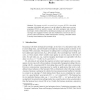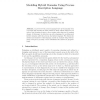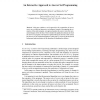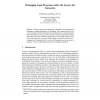103
Voted
ASP
2005
Springer
15 years 8 months ago
2005
Springer
In this paper we consider an extension of the answer set semantics allowing arbitrary use of strong negation. We prove that the strong negation extension of any intermediate logic ...
137
click to vote
ASP
2005
Springer
15 years 8 months ago
2005
Springer
The extended answer set semantics for simple logic programs, i.e. programs with only classical negation, allows for the defeat of rules to resolve contradictions. In addition, a pa...
146
Voted
ASP
2005
Springer
15 years 8 months ago
2005
Springer
Possibilistic Stable model Semantics is an extension of Stable Model Semantics that allows to merge uncertain and non monotonic reasoning into a unique framework. To achieve this a...
149
Voted
ASP
2005
Springer
15 years 8 months ago
2005
Springer
We present extended conceptual logic programs (ECLPs), for which reasoning is decidable and, moreover, can be reduced to finite answer set programming. ECLPs are useful to reason ...
151
click to vote
ASP
2005
Springer
15 years 8 months ago
2005
Springer
A new exact algorithm for computing answer sets of logic programs is presented and analyzed. The algorithm takes a logic program in Kernel normal form as an input and computes its ...
154
click to vote
ASP
2005
Springer
15 years 8 months ago
2005
Springer
Answer Set Programming (ASP) and propositional satisfiability (SAT) are closely related. In some recent work we have shown that, on a wide set of logic programs called “tight”...
136
Voted
ASP
2005
Springer
15 years 8 months ago
2005
Springer
In previous work, action languages have predominantly been concerned with domains in which values are static unless changed by an action. Real domains, however, often contain value...
148
click to vote
ASP
2005
Springer
15 years 8 months ago
2005
Springer
This paper outlines a novel approach to the computation of answer sets in an evolving and interactive environment. Instead of recomputing the semantics of the entire program, our a...
128
Voted
ASP
2005
Springer
15 years 8 months ago
2005
Springer
This paper discusses the background, algorithms and implementation techniques to support programmers in ‘debugging’ logic programs under the answer set semantics. We first inv...
214
Voted
ASP
2005
Springer
15 years 8 months ago
2005
Springer
Preferences are useful when the space of feasible solutions of a given problem is dense but not all these solutions are equivalent w.r.t. some additional requirements. In this case...




